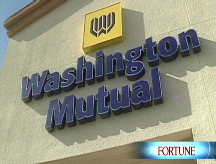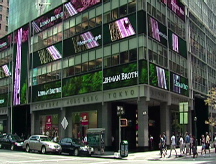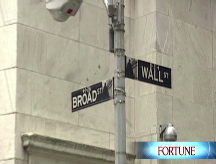Stocks get pummeled
Wall Street sees worst day in 7 years, with Dow down 504 points, as financials implode.

NEW YORK (CNNMoney.com) -- Stocks tanked Monday, amid the largest financial crisis in years after Lehman Brothers filed for the biggest bankruptcy in history, Bank of America said it would buy Merrill Lynch and AIG slumped on fears that it can't raise cash.
Treasury prices rallied as investors sought the comparative safety of government debt, sending the corresponding yields lower. Oil prices tumbled, falling well below $100 a barrel on slowing global economic growth. The dollar rallied versus the euro and gold prices spiked.
The Dow Jones industrial average (INDU) lost 504 points, or 4.4%. It was the biggest one-day decline for the Dow on a point basis since Sept. 17, 2001, when the market reopened for trading after having been closed in the aftermath of 9/11 terrorist attacks. On a percentage basis, it was the biggest decline since July 19, 2002.
The Standard & Poor's 500 (SPX) index lost 4.7%, its worst day since Sept. 17, 2001, when it plunged 4.9%. The S&P 500 also closed at its lowest point since Oct. 27, 2005.
The Nasdaq composite (COMP) lost 3.6%, its worst single-session percentage decline since March 24, 2003. It left the tech-fueled average at its lowest point since March 17 of this year.
"It was an ugly day," said James King, president and chief investment officer at National Penn Investors Trust Company. "Lehman's failure to find a suitor and Merrill deciding to cash in their chips before a similar fate could befall them really stoked the fears of the public."
AIG exacerbated those fears in the afternoon. And all the bad news isn't out there yet, King said. "Investor confidence is at the lowest point we've seen in a while."
He said that after the government bailout of Fannie Mae and Freddie Mac last week and all the other financial market bad news, this was just too much for investors.
But it doesn't mean that the stock market is likely to see these kind of massive selloffs on a regular basis, King said. Nasdaq and S&P futures pointed to a higher open Tuesday, when fair value is taken into account.
After the close of trade, S&P said it is cutting its debt rating on mortgage lender Washington Mutual (WM, Fortune 500) to junk status, reflecting the ongoing credit market meltdown and WaMu's exposure to the housing market. WaMu shares fell almost 27% during the session and lost another 11% in extended-hours trading.
Also after the close, Hewlett-Packard (HPQ, Fortune 500) said it will cut 24,600 jobs, or 7.5% of the combined workforce of HP and the recently-purchased EDS. Shares were barely changed in extended-hours trading.
Stock market meltdown: Global markets tumbled as investors reeled after Lehman Brothers filed for bankruptcy, Merrill Lynch was forced to sell itself to Bank of America and investors awaited AIG's restructuring announcement.
"You have to throw out the history books because there's really nothing to compare this to," said Jim Dunigan, chief investment officer at PNC Advisors.
"Any speculation as to what inning we're in becomes difficult because each step of the way seems to bring another drop," Dunigan said.
Art Hogan, chief market strategist for Jefferies & Co., said the magnitude of the financial industry fallout is unprecedented, and could only be compared to the Great Depression of the 1930s or the railroad bankruptcies of the 1800s.
"We've never witnessed this before," said Hogan. "There's no road map for this."
Dow-component insurer AIG and mortgage lender Washington Mutual are the latest companies to spark investor fear.
AIG has been scrambling to raise enough cash to fend off ratings agency downgrades and stay afloat.
N.Y. Gov. David Paterson said in the afternoon that AIG will be allowed to use $20 billion in assets through its subsidiaries to stay afloat, basically providing itself with a bridge loan. AIG has also reportedly asked the Federal Reserve for a roughly $40 billion bridge loan over the weekend.
In addition, the federal government has asked Goldman Sachs and JP Morgan to lead a $70 billion to $75 billion lending pool for the company, the Wall Street Journal reported. (Full story)
Shares of AIG (AIG, Fortune 500) slumped 60.8%.
The developments of the day cemented for investors that the credit crisis is far from over, six months after the near-collapse and government rescue of Bear Stearns.
"The landscape has changed and a lot of the major players who were are no more, so of course people are panicked," said Stephen Leeb, president at Leeb Capital Management.
"But it's not the end of capitalism," he said. "This may usher in something worse than what we've seen in terms of the economy, but the companies left standing at the end of this will be OK."
Merrill Lynch's buyout was perhaps providing some reassurance to investors, said Dunigan, in that it shows there is still value in the market.
Losses were also tempered by the Federal Reserve's decisions to loosen up its lending restrictions. The central bank could end up cutting the fed funds rate, its key overnight bank lending rate, when it meets Tuesday, analysts said. The fed funds rate currently stands at 2.0%.
Also helping Tuesday: news that a group of 10 banks including Morgan Stanley, Goldman Sachs and Barclays had given up to $7 billion each to create a $70 billion lending pool to help smaller institutions.
Lehman bankruptcy: Lehman Brothers (LEH, Fortune 500) announced it was filing for bankruptcy, after weekend talks aimed at saving the 158-year old firm failed.
The filing came shortly after midnight Monday, after Bank of America and Barclays pulled out of negotiations to acquire Lehman, which has lost $60 billion in bad real estate bets and the credit market's collapse.
Unlike with Bear Stearns back in March, the government was reportedly not willing to help finance a takeover, bailout or restructuring of Lehman Brothers. This reportedly contributed to the reluctance of other firms to strike a deal with the troubled company. (Full story)
Speaking in the afternoon, Treasury Secretary Henry Paulson said that he hasn't ruled out additional government bailouts for the future. He also said that the banking system is sound. (Full story).
Lehman shares plunged 94%. (Full story)
Merrill Lynch buyout: After pulling out of the Lehman negotiations, Bank of America (BAC, Fortune 500) announced that it will buy Merrill Lynch (MER, Fortune 500) for $50 billion in stock. The price values the company at more than $29 a share, a more than 70% premium from Merrill's closing price on Friday of $17.05.
The company has posted losses of more than $17 billion over the last four quarters and saw its stock plunge 27% last week.
Shares had rallied more than 15% during the session Monday before ending little changed. Bank of America tumbled 21%. A variety of other financial shares plunged, including Citigroup (C, Fortune 500), Morgan Stanley (MS, Fortune 500), Goldman Sachs (GS, Fortune 500) and JP Morgan Chase (JPM, Fortune 500).
Market breadth was negative, with losers beating winners by over 18 to 1 on volume of 1.8 billion shares. On the Nasdaq, decliners topped advancers by over six to one on volume of 2.75 billion shares.
10-bank emergency fund: In a bid to calm the markets, the Federal Reserve announced plans Sunday to loosen its lending restrictions to the banking industry. A consortium of 10 leading domestic and foreign banks, including Goldman Sachs (GS, Fortune 500), Citigroup (C, Fortune 500), Barclays (BCS) and Morgan Stanley (MS, Fortune 500), agreed to create a $70 billion fund to lend to troubled financial firms.
The Federal Reserve, meeting Tuesday, could cut the fed funds rate, a key short-term interest rate, from the current level of 2%, analysts said.
Oil: Oil prices plunged as investors continued to bet on a global economic slowdown. Additionally, early reports showed Hurricane Ike didn't do as much damage to oil rigs and refineries in the Texas Gulf region as expected.
Oil prices were down $5.47 a barrel to settle at $95.71, the lowest point since Feb. 15. Oil dipped below $100 a barrel on Friday for the first time in five months.
Other markets: In global trade, European and Asian stocks ended lower. Many major Asian markets, including Tokyo and Hong Kong, were closed for holidays.
Treasury prices soared as investors poured money into the relatively safe-haven. The rally sent the benchmark 10-year note tumbling to 3.39% from 3.72% late Friday.
In currency trading, the dollar slipped versus the euro and gained against the yen.
COMEX gold for December delivery gained $22.50 to $787 an ounce. ![]()





